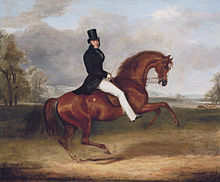George Stanhope, 6th Earl of Chesterfield
|
The Right Honourable The Earl of Chesterfield PC |
|
|---|---|

George Augustus Frederick, 6th Earl of Chesterfield, on his favourite hack by Sir Hercules
|
|
| Master of the Buckhounds | |
|
In office 30 December 1834 – 8 April 1835 |
|
| Monarch | William IV |
| Prime Minister | The Viscount Melbourne |
| Preceded by | The Earl of Lichfield |
| Succeeded by | The Earl of Erroll |
| Personal details | |
| Born | 23 May 1805 |
| Died | 1 June 1866 (aged 61) |
| Nationality | British |
| Political party | Tory |
| Spouse(s) | Hon. Anne Elizabeth Weld-Forester (d. 1885) |
| Alma mater | Christ Church, Oxford |
George Stanhope, 6th Earl of Chesterfield PC (23 May 1805 – 1 June 1866), styled Lord Stanhope until 1815, was a British Tory politician, courtier and race horse owner. He served as Master of the Buckhounds under Lord Melbourne from 1834 to 1835.
Chesterfield was the son of Philip Stanhope, 5th Earl of Chesterfield, and his wife Lady Henrietta, daughter of Thomas Thynne, 1st Marquess of Bath, and was educated at Eton and Christ Church, Oxford.
He succeeded his father in the earldom in 1815 at the age of ten and later took his seat on the Tory benches in the House of Lords. He served briefly in the Tory administration of Sir Robert Peel as Master of the Buckhounds from December 1834 to April 1835 and was sworn of the Privy Council in December 1834.
Lord Chesterfield had a great passion for horse racing and spent most of his early years indulging in that pursuit. Although he had some success on the turf, winning the "Oaks" twice, his victories were not frequent enough to pay for the large string of horses he had in training or to finance his lifestyle of lavish party giving and gambling. His racing colours of red cap and jacket with blue sleeves were also carried to victory by Tom Olliver in the 1843 Grand National aboard his horse Vanguard. In 1840, after the success of "Crucifix" he decided to give up his expensive mode of living and retire to Bretby. He did construct a gallop of two miles to exercise his horses. Many eminent people visited Bretby to try out their horses or for shooting in Bretby Park. Amongst them were the Earl of Wilton, the Earl of Londesborough, Lord Newport and Sir Henry des Voeux. The best jockeys also came to Bretby.
...
Wikipedia
